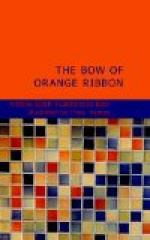He returned to barracks one Sunday afternoon, and was moodily thinking over these things, when his orderly brought him a letter which had arrived during his absence. It was from Katherine. His face flushed with delight as he read it, so sweet and tender and pure was the neat epistle. He compared it mentally with some of the shameless scented billet-doux he was in the habit of receiving; and he felt as if his hands were unworthy to touch the white wings of his Katherine’s most womanly, wifely message. “She wants to see me. Oh, the dear one! Not more than I want to see her. Fool, villain, that I am! I will go to her. Katherine! Kate! My dear little Kate!” So he ejaculated as he paced his narrow quarters, and tried to arrange his plans for a Christmas visit to his wife and child.
First he went to his colonel’s lodging, and easily obtained two weeks’ absence; then he dressed carefully, and went to his club for dinner. He had determined to ask Lady Capel for a hundred pounds; and he thought it would be the best plan to make his request when she was surrounded by company, and under the pleasurable excitement of a winning rubber. And if the circumstances proved adverse, then he could try his fortune in the hours of her morning retirement.
The mansion in Berkeley Square was brilliantly lighted when he approached it. Chairs and coaches were waiting in lines of three deep; coachmen and footmen quarrelling, shouting, talking; link-boys running here and there in search of lost articles or missing servants. But the hubbub did not at that time make his blood run quicker, or give any light of expectation to his countenance; for his heart and thoughts were near a hundred miles away.
Sunday night was Lady Capel’s great card-night, and the rooms were full of tables surrounded by powdered and painted beauties intent upon the game and the gold. The odour of musk was everywhere, and the sound of the tapping of gold snuff-boxes, and the fluttering of fans, and the sharp, technical calls of the gamesters, and the hollow laughter of hollow hearts. There was a hired singing-girl with a lute at one end of the room, babbling of Cupid and Daphne, and green meadow and larks. But she was poorly dressed and indifferent looking; and she sang with a sad, mechanical air, as if her thoughts were far off. Hyde would have passed her without a glance; but, as he approached, she broke her love-ditty in two, and began to sing, with a meaning look at him,—
“They say there
is a happy land,
Where husbands never prove untrue;
Where lovely maids may give their
hearts,
And never need the gift to rue;
Where men can make and keep a vow,
And wives are never in despair.
I’m very fond of seeing sights—
Pray tell me, how can I get there?”
The question seemed so directly addressed to Hyde that he hesitated a moment, and looked at the girl, who then with a mocking smile continued,—




